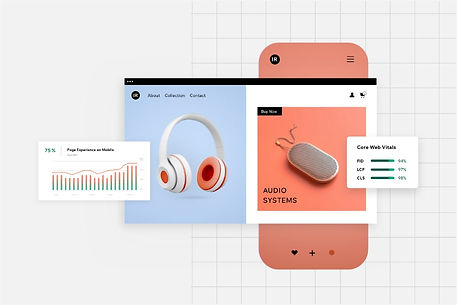Reliable performance built into every site
From server optimizations to strategic caching—we continuously optimize our entire platform to provide excellent performance.
Robust infrastructure
Our globally distributed CDN and data centers will deliver content as quickly and efficiently as possible—regardless of your location, network or device.
Pixel-perfect images
Wix automatically resizes, crops and transforms your media on our servers and converts them to WebP to ensure faster downloads and the highest possible quality on any device.
Real-time monitoring
Performance data is anonymously collected across all Wix sites—enabling us to monitor and improve our performance, and provide live status reports for all our users.
Faster file delivery
All Wix sites use HTTP/3 or HTTP/2 for faster, more efficient downloads. In addition, all components are delivered compressed using the latest Brotli or gzip.




See how fast your sites load
Use Wix’s Site Speed dashboard to test, analyze and optimize your site performance for both desktop and mobile.
Monitor it over time, and see how it compares to other sites in your industry.
Plus, get practical advice and tips on improving your site’s speed to provide a better user experience for your visitors.
To access the Site Speed dashboard, go to desktop.
Use Wix’s Site Speed dashboard to test, analyze and optimize your site performance for both desktop and mobile.
Monitor it over time, and see how it compares to other sites in your industry.
Plus, get practical advice and tips on improving your site’s speed to provide a better user experience for your visitors.
Get best practices from the experts
Learn more about performance
FAQ
1. How is Wix prioritizing Core Web Vitals (CWV)?
At Wix, we have a performance-first culture. Every new feature, component and element that we create is built with performance in mind. Over the past year, we’ve managed to achieve dramatic improvements for CWV. As a result, we’ve increased the ratio of Wix sites in the Google CrUX report with good scores for all three CWV by 8x. View the latest performance data in Google’s Core Web Vital Technology Report. To learn more about how Wix prepared for CWV, check out this webinar hosted in partnership with Google.
2. How does Wix utilize CDNs?
All static resources, such as images and JavaScript files, are served from CDNs. We use a variety of CDN providers, and automatically select the ones that provide the best speed and resilience for each site visitor. In addition, the pages’ HTML, as well as API calls, are now also served by a CDN. They are cached for as long as possible, and are invalidated automatically whenever you change something in your site data. In order to support the best flow, we recommend hosting domains on our platform or using our nameservers.
3. How is Wix optimizing images for better performance?
Everytime you add an image to your site, Wix automatically optimizes it to ensure the highest quality and smallest download size. Images are resized and cropped for you so that only the pixels needed are downloaded to the browser. Additionally, images are converted to modern image formats, such as WebP, reducing download size by up to 20%. Lazy loading is also used so that images are downloaded only when they’re actually required.
4. Why are Google Lighthouse scores different for desktop and mobile?
PageSpeed scores for mobile are usually lower than desktop. That’s because mobile devices generally have slower processors and take more time to resize texts and images. Plus, PageSpeed Insights displays the site loading time on mobile with a simulated 3G connection on a Moto G4 device. Keep in mind that your mobile score may not be reflective of the experience all your site visitors have.
5. What is the “Field Data” in the Google PageSpeed Insights (PSI) and why is it not available for all URLs?
When PSI is given a URL, it looks it up in the Chrome User Experience Report (CrUX), which provides data based on how real-world Google Chrome users experience popular destinations on the web—this is known as “field data”. Because field data is based on how real users have experienced a site, it’s only relevant if there is enough traffic—sites without many visitors won’t have field data.
If it’s available, PSI uses the field data to report the First Contentful Paint (FCP), First Input Delay (FID), Largest Contentful Paint (LCP), and Cumulative Layout Shift (CLS) metric data for the “origin” (the website’s domain) and potentially specific page URLs. Field data is a more accurate way to measure site performance than “lab data” as it represents a true user experience, and is the basis for Core Web Vitals.
6. How does Wix ensure that my site performance continues to improve?
Every feature developed at Wix is tested to ensure that it doesn’t hurt the performance of existing sites. This is accomplished by conducting automated acceptance tests that compare the performance of a wide variety of sites before and after the change. If any performance degradation is detected, the deployment of the new feature is blocked until this is fixed. In addition, the performance of every site session is monitored (anonymously), in real time. This enables us to verify that your visitors experience the best possible site speed. In order to ensure the best performance and user experience for your sites, learn more about best practices and tips for site optimization.






